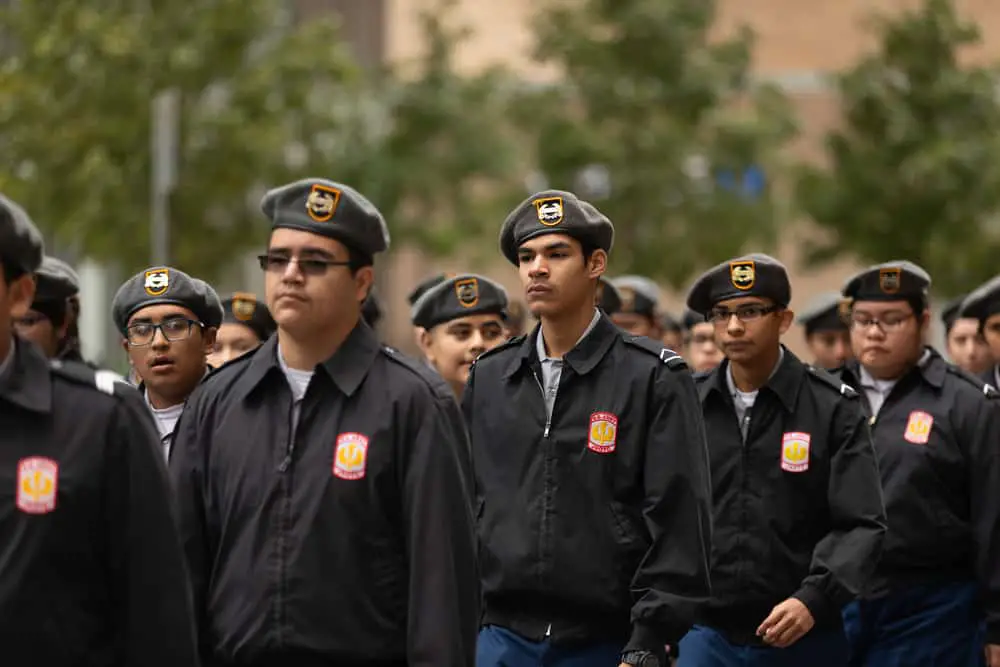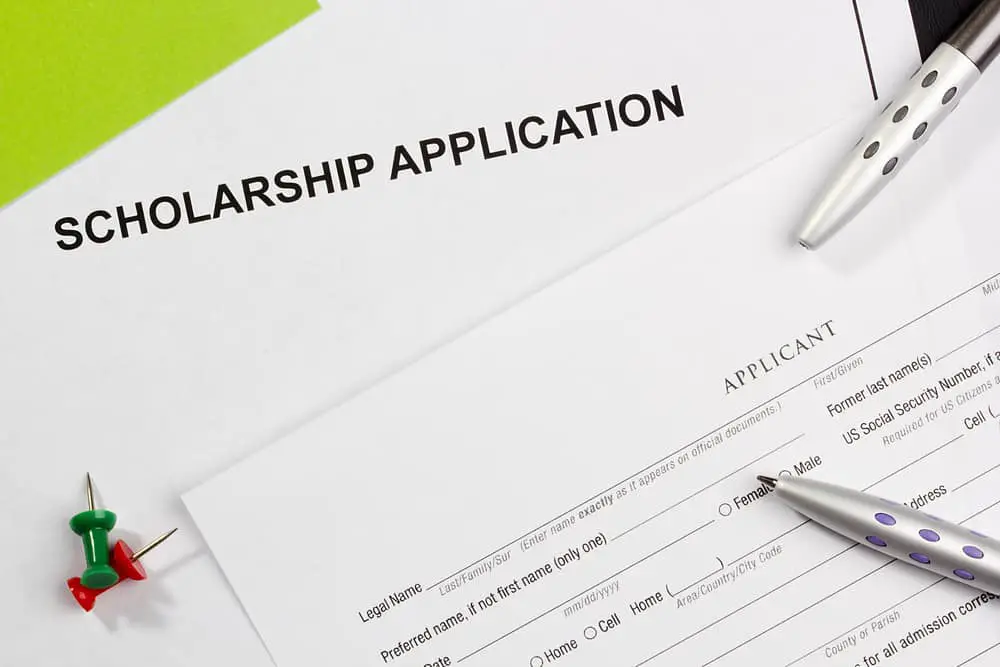
The ROTC program for undergraduate college students is designed to prepare cadets for the military through many different advantages and benefits. Students who successfully complete all 4 years of an ROTC program and graduate college can enter a military branch as a commissioned officer and likely have their entire undergraduate degree paid for in the process. With this in mind, what are the basics to know about ROTC enrollment and scholarships?
Enrolling in an ROTC program has few initial restrictions for the first two years of college. Cadets who choose to enroll in the advanced portion of the program in the final 2 years will likely be offered a full scholarship if the cadet agrees to a post-college Armed Forces service commitment.
Are you planning on enrolling in collegiate ROTC? Are you curious about the program and the scholarships offered? If so, this article is for you. In this comprehensive guide, we will explore all there is to know about the enrollment process for the ROTC program as well as the types of scholarships offered and the stipulations. Read on to find out the answers to these important questions and more.
ROTC Interviews
So, you have made the decision to enroll in your college’s ROTC program and you are likely wondering what happens next? Unless you have accepted a scholarship when completing a high school JROTC program, you will typically have to interview with representatives of the program and/or your college’s professor of military science.
But there are a few different trajectories with the ROTC program that will differ based on exactly what you want to achieve with the program.
If you would like to do the full, 4-year ROTC program in conjunction with earning your degree, the most obvious step to take would be to schedule an interview concerning an ROTC scholarship.
ROTC scholarships are offered in 2,3, or 4-year increments, with many students wishing to complete the entire program opting to pursue the 4-year scholarship which will pay for a successful cadet/student’s entire undergraduate degree, and many associated expenses that come with college.
You can take the ROTC Basic Course (freshman and sophomore years) as electives if you choose and this rarely ever requires an interview since the Basic Course is open for enrollment. Completion of the Basic Course requires no service commitment, and if you choose, you can speak to your advisor and ROTC faculty about choosing to continue into the ROTC Advanced Course in your final 2 years.
The Advanced Course will require a service commitment, and if accepted, almost always comes with a 2-year scholarship that covers your last 2 years of college.
For any ROTC scholarship, there will be an application and then a required interview with program officiants and military science faculty. Both your application and your interview performance will be used to determine eligibility for the advanced course and the awarding of the scholarship and your future in the military.
Let’s explore some of the common questions you may be asked in the interview, some good questions to ask at the end of the interview, and some additional requirements or policies to be aware of.
ROTC Interview Questions
Each branch of the ROTC (Army, Air Force, and Navy/Marines) will use an interview sheet to score your responses. Here is a sample of what the interviewer will likely use for an Army ROTC scholarship interview.
The interview questions you can expect will run the gamut from self-explanatory to more in-depth and analytical character assessments based on probing questions that align with both the ROTC program and your future commitment to the Armed Forces.
Here are a few possible sample questions to expect as well as tips on how best to answer these questions.
Q: What do you think life will be like in the ROTC program?
There is no true right or wrong response with a question like this, but you should be aware of exactly what 4 or 2 years of the ROTC program entails. Be sure to research your university’s ROTC program thoroughly, at least weeks before the interview, and be aware that there are certain expected disciplines and additional activities that come with the program along with your regular degree studies.
The interviewer will be assessing your response to the question based on overall interest and enthusiasm as well as to see if you are aware of what to expect in ROTC.
Q: What branch do you want to serve in and why that branch specifically?
In order to receive an ROTC scholarship, you must select a branch to fulfill your service commitment in post-college. The professor will want to hear a selected choice and you need to establish your specific reasonings for choosing that branch. Do not be indecisive when it comes to this question; know full well which branch of the Armed Forces you would like to serve in and be able to articulate what appeals to you about that specific branch.
For example, you may like the Air Force because aviation has long fascinated you or you want to serve your country in a maritime setting in the Navy.
Q: Your GPA is the bare minimum that we require. What can you do to improve your GPA before graduation?
If this is the case for you, and you are wanting to enter the advanced portion of the ROTC program on a scholarship, you should expect the interviewer to likely highlight this point.
You should be prepared to not only commit 100% of your energy to the ROTC program, but you must also be willing to give an equal amount to raise your GPA as well. The interviewer wants to see that you are committed and passionate to succeed to the fullest as well as to see if you have what it takes to multitask.
Answer the question humbly but not outright apologetically, and be sure to highlight and emphasize how dedicated you will become to raise your GPA and enter your service commitment as a top-tier ROTC/college graduate. Pivot to how the program will help you to become dedicated and committed in all aspects of life and not just in regards to the program.
Most of all, make sure you are calm, professional, and respectful throughout the entire interview. Make sure you are overwhelmingly confident—but not cocky. Look your interviewer in the eyes at all times and by all means, do your research about the program and your chosen Armed Forces branch well in advance of the interview. Know what you are talking about with 100% accuracy.
Make sure you are well-groomed and dress formally and professionally. You don’t need to dress as if you are meeting royalty—but upscale, business casual is definitely recommended.
ROTC Questions to Ask

On the flip side of the equation, it is also a good idea to ask some questions when directed–usually at the end of the interview.
By asking questions when you are asked if you have any, this will show that you are 100% invested in and even enthusiastic about the ROTC program.
You can ask anything that is on your mind–but that doesn’t mean that certain questions you may have will be a good idea. You should avoid asking any questions that should have an obvious answer and certainly avoid asking questions involving money, benefits, consequences of dropping out, combat zone questions, and the like.
Let’s take a look at some possible sample questions to ask and ones to avoid completely.
Q: Can you tell me about any special teams or challenges that are offered in the program?
This is a good question because generally, an interviewer will focus specifically on the program requirements and your service commitment. By asking about extracurricular activities or team challenges or exercises, such as ranger challenges, you are showing your dedication and genuine interest in the program and not just a means to accelerate through the benefits offered by the program.
Q: Could you tell me what else I can do to prepare for the program?
Again, this is a simple question that manages to show commitment and dedication to the program. Do not let a stellar record or good grades and PT scores speak for you as this can come off as arrogance. Ask the professor about what you can do to be 100% prepared and what in their own advice are good aspects of the program to focus on.
Q: Does the ROTC program at this university have additional support?
This question may sound vague or personal, but it shows that you are up-to-date on the sometimes chaotic relationship between the ROTC program and universities throughout the decades. It shows that you are in favor of the program and dedicated to it even if there are external dissenters, perhaps even the host university, that are not fully engaged or supportive of the program as a whole.
Here are some questions you should avoid asking at all costs.
Q: What are the penalties if I drop out of the advanced portion of the program?
You do not need to study this question long to see just how bad of a question it is to ask during an interview for a scholarship. This conveys that you have doubts about the program or doubts within yourself. It is not too far off to immediately assess that your application will be denied if you were to ask this type of question.
Q: How much will my scholarship be for?
Not only have you not been accepted into the program yet or granted the scholarship, but this kind of question will also convey that you are only interested in the financial benefits of the scholarship and not at all serious about your service commitment. There are ways to research estimates surrounding this question, and we will touch on scholarship amounts more below.
Q: Is the physical training (PT) component difficult?
PT in any branch of the Armed Forces is always going to be physically challenging–this has always and will always be the case for very specific reasons. This is an example of a far too obvious question to ask.
Does ROTC Test for Alcohol?
By the time many cadets reach the advanced portion of the program during their junior year in college, many will reach the legal drinking age of 21. If you are 21 and older, you can recreationally drink alcohol with no repercussions. But there are some things to keep in mind.
For Army ROTC, you can drink alcohol if you are 21 and older and you do not drink at any ROTC-related events. Any criminal charges stemming from alcohol abuse could lead to the loss of your scholarship.
For Navy or Marine ROTC, you will be disqualified if you have been previously convicted of alcohol or drug-related charges. While in the program, you can drink alcohol while off-duty as long as you are 21 or older and do not get into any altercations as a result of being intoxicated.
For Air Force ROTC, the same rules apply.
All branches may decide to test for alcohol abuse at any time although this is more concentrated around suspected drug abuse.
Does ROTC Drug Test?
In all branches of ROTC, drug use of any kind, either during the program or as the result of a past criminal conviction with drug charges, will lead to removal from the program and forfeiture of any scholarships.
All branches reserve the right to order drug tests at any time.
ROTC Security Clearance
Before graduation from an ROTC program and the beginning of a service commitment, all successful cadets will need to apply for and undergo an investigation to receive a security clearance.
The security clearance is a comprehensive background check, but it should be understood that all convictions, arrests, traffic violations, examples of poor credit, and financial indiscretions will be checked and will be reported.
Additionally, character references will be made that will likely result in interviews being conducted with your family and friends, past teachers, social organizations, etc., attesting to your overall character and demeanor. Basically, your past is put under a microscope.
The most important aspect of the security clearance is actually all the information you give for the questions asked on the security clearance applications–which is a federal document.
If you lie on any of these questions or present fabricated information, the application is almost always denied, and the institution reserves the right to even take legal action.
Certain past indiscretions (we all have a past) can be discussed and even likely cleared–as long as you are 100% honest and upfront about all of it. You will have to pass this security clearance in order to become a commissioned officer.
ROTC Physical Fitness Standards

When it comes to physical training, each branch of the Armed Forces has some similarities and differences.
The Basic Course of ROTC in the first two years of college is more like an open and exploratory program for practically anybody with an interest in military science. There are typically no requirements for the Basic Course since these are electives, although you should expect to do some kind of physical training at a low capacity in the Basic Course.
The PT requirements come into focus for students seeking an ROTC scholarship and those who wish to move on to the Advanced portion of the ROTC program in the final 2 years.
In short, a certain level of physical fitness is required for the Armed Forces, and the same applies (to a somewhat less intense degree) for ROTC programs with scholarships attached. In fact, passing a PT assessment will be one of the requirements of an ROTC scholarship application, and these scholarships can be highly competitive, which means you have to ace this portion of the application.
Each ROTC branch is different, so let’s take a look at the PT standards for each.
Air Force ROTC PT Standards
The PT standards in Air Force ROTC will culminate in the Physical Fitness Assessment (PFA) test that must be passed in order to receive an Air Force ROTC scholarship.
This assessment is the exact same test given to those who outright enlist into the Air Force and includes push-ups, sit-ups, and a 1.5-mile run that is timed at 1 minute.
This PT assessment counts towards 5% of the composite score used to determine the scholarship award. Applicants should train hard and accurately in the weeks preceding the application.
The minimum required passing scores for all 3 activities in the assessment are 67/58/9:12 for males and 47/54/10:23 for females.
Army ROTC PT Standards
The Army ROTC fitness standards required for the recipient of a scholarship are measured by the Presidential Fitness Test (PFT).
The 3 components of this test are push-ups, curl-ups, and a 1-mile run with 1-minute on the timer.
Unlike the Air Force PT requirement, the Army PT requirement counts towards 10% of the overall score in the consideration for a scholarship.
The minimum required passing scores for males are 50/50/6:30 and 40/50/7:18 for females.
Navy ROTC PT Standards
Navy ROTC uses the Applicant Fitness Assessment (AFA) as the PT component that is used to determine the awarding of a scholarship.
The test consists of 2-minute push-ups, 2-minute sit-ups, and a 1-mile run all of which are timed. The AFA is worth 5% of the overall scoring results used to determine the awarding of a scholarship.
Males need to score a minimum of 95/75/5:20 and females need to score at least 95/50/6:00 in order to pass the test.
Navy ROTC Marines PT Standards
If you are seeking the scholarship for the Marines component of Navy ROTC, the Marine Corps Physical Fitness Test will be used for the application process. This is by far the most challenging of all the tests.
The test will be divided between “dead-hang” pull-ups, 2 minutes of ab crunches, and a 3-mile run all of which are timed. For the dead-hang pull-ups component, applicants will have to perform these exercises until the point of exhaustion and the test administrator will calculate the number of pull-ups and the overall time into the final calculation of the test grade.
The Marines ROTC PT Test accounts for a whopping 30% of the overall grading criteria when deciding on scholarship awards. Males will need to score at least 270 on the test and 262 for females.
How to Get in Shape for ROTC
With these tests and scores in mind as requirements to receive an ROTC scholarship, potential ROTC cadets should take ample amounts of time to train and prepare for the tests well in advance.
When deciding on how to prepare for ROTC PT, be sure to start with an overall fitness and wellness plan that highlights healthy eating and overall aerobic and cardio exercise routines as well as some strength training.
Running and jogging is a perfect activity to do daily to prepare for the timed run of which all branches of ROTC require. After a few weeks of settling into the routine, start timing yourself as you run at least 1 or 1,5 miles in a minute or less.
For the push-ups and curl-ups, start slow with these activities a few months before the application process. Increase your capacity as the weeks go by until you can do multiple push-ups and curl-ups inside of a minute or 2 minutes for Navy ROTC.
As you can see, each branch varies in how much weight it uses to determine the PT test in the overall decision for awarding an ROTC scholarship.
Train for each test according to your selected branch and you may need to train a bit longer with more intensity for Navy ROTC Marines.
Air Force ROTC Weight Standards
The weight requirements for Air Force ROTC through scholarships are largely determined based on a cadet’s height and weight compared to BMI (body mass index).
Since 5’4 and 5’8 are considered average heights for women and men respectively, a cadet standing 5’4 would need to be at or below 145 pounds and at or below 164 pounds in order to meet the general weight requirement for Air Force ROTC.
Army ROTC Weight Standards
Weight requirements for Army ROTC vary widely and are based on height, BMI, and body fat percentages. For the full weight requirements for both males and females seeking an Army ROTC scholarship, please take a look at this chart.
Navy ROTC Weight Standards
Weight requirements for Navy ROTC vary widely and are based on height, BMI, and body fat percentages. For the full weight requirements for both males and females seeking a Navy ROTC scholarship, please take a look at this chart.
ROTC Physical
All branches of ROTC will require the successful passing of a medical evaluation by either a military doctor or a designated physician contracting with the ROTC program.
This will include a standard physical as well as a medical screening of your current state of health and an accurate listing of any past medical problems either physical or mental.
This evaluation is administered by the Department of Defense Medical Examination Review Board (DoDMERB). The evaluation can be lengthy, and there are some disqualifications to be aware of.
ROTC Scholarships

As mentioned earlier, scholarships for all branches of ROTC are a common part of any advanced portion of the program, which is the last 2 years. You may have already accepted a 4-year scholarship upon the completion of JROTC in high school. Furthermore, you can start inquiring about a 4-year scholarship between high school graduation and the start of freshman year.
You do not have to wait until junior or senior year to apply for an ROTC scholarship since there are 2,3, and 4-year scholarships available. You could even apply for a 4-year scholarship before junior year and inquire about going on to graduate school to receive a master’s degree to fulfill the 4-year scholarship. There are many types of scholarships available and lots of information to cover concerning the fine print and the amounts of the awards.
Scholarships Types and Amounts
An ROTC program is split into two parts: basic (first two years of college) and advanced (final two years of college). The basic course includes training and electives—including at least one military-related course per semester—during your freshman and sophomore years. If you enroll in the basic course, there is no service obligation.
Furthermore, no matter what your reason for choosing to take ROTC, you can either choose to officially enroll in the program or not enroll and just gain the experience.
If you enroll, you can either accept a contract that includes a service commitment and a scholarship that pays for your degree or, choose not to sign a contract and only complete the first two years of the program, making ROTC somewhat extracurricular but you still receive elective credits.
ROTC scholarships are merit-based, and help to cover all or a portion of tuition, fees, and other expenses such as books, and living expenses for two to four years. Typically, qualification for scholarships is based on GPA, test scores, and certain medical and fitness standards. So, you can use a scholarship to just cover the final 2 years of college or accept a 4-year scholarship and consider grad school.
As mentioned, ROTC and graduate school are available through two different trajectories. If you have completed your bachelor’s degree along with the ROTC undergrad program, you can request to continue through graduate school to earn a master’s degree. If you received a scholarship for your advanced portion of ROTC as an undergrad, you can request an additional two years of funding to cover all the costs of your master’s degree.
But this does not always get granted, and your branch may very well require you to complete your commitment in the branch as an officer before releasing you to pursue graduate school. If you are wishing to attend medical or law school, you may get a waiver to delay active duty but proof of admission will be required, and still, there are no guarantees your branch will allow this.
The second trajectory, and the most common, is for recent college graduates who basically want to do the ROTC program in graduate school. Since a master’s degree is commonly 2 years long, the graduate student will complete the advanced portion of the undergrad ROTC program (junior and senior year). But there are some requirements.
Graduate students will need to complete a course over the summer called Basic Camp that typically lasts about 6 weeks. This accelerated course covers what students missed by not taking all 4 years of the ROTC undergrad program, specifically the 100 and 200 level military training courses.
The various amounts of the scholarships range as far as exact monetary totals. A typical, 4-year scholarship for ROTC in any branch can range in cost as high as $180,000. This is broken down into covered tuition, fees, book allowances, room and board, meals, and a monthly stipend as well but the actual cost will revolve around the overall cost of your bachelor’s degree at a specific university.
Service Obligations for Scholarship Recipients
If you accept an ROTC scholarship, you will be required to sign a contract with your chosen branch of the Armed Forces guaranteeing that you will fulfill a post-college service commitment in that branch of the Armed Forces.
Breaking this contract can result in legal action being levied against you as well as the full return of all the scholarship funds.
A good way to think of the timing of this service commitment is one year for each year of a scholarship used. So, if you were granted a 4-year scholarship, you are obliged to serve 4 years in your chosen branch as a commissioned officer.
Air Force ROTC Scholarship Acceptance Rate
The acceptance rate for the Air Force ROTC scholarship is largely targeted around your interview assessment and your grades. A little more than half of all Air Force ROTC applications in a single year are typically rewarded.
High SAT and ACT scores, an average to above-average GPA, your overall character and ability to articulate your thoughts, and a selected major in the fields of technology, science, and engineering are all things to keep in mind when considering applying for the Air Force ROTC scholarship.
Navy ROTC Scholarship Acceptance Rate
The Navy ROTC scholarship is highly competitive, and if you are choosing to apply for the Marines components of ROTC through the Navy, that is by far the hardest ROTC scholarship to win.
For the Navy, about 1,500 out of 5,000 scholarships are awarded, and the Navy ROTC review board is a bit elusive in how they decide on scholarship recipients. It can be gathered that Navy ROTC scholarship determinations revolve heavily around high test scores in mathematics and chosen majors in the math and sciences.
For the Marines ROTC component, between 100-300 ROTC scholarships are awarded each year out of thousands of applications. A part of this may have to do with the program being offered at only a select few universities. For the Marines, a stellar PT test result at a very high score is one of the most prominent scores looked at.
Army ROTC Scholarship Acceptance Rate
Army ROTC scholarships can be said to be the most well-rounded when it comes to the selection process. About half of all yearly scholarships applied for were awarded for Army ROTC.
Army ROTC likes to look at and judge all application requirements. GPA, test scores, PT assessment, interview assessment, character assessment, dedication, and your willingness to succeed are all judged.
ROTC Troubles
Nobody is perfect, and it is important to know of the various potential troubles that may come with ROTC if you step out of line or fail to succeed at both the program and your regular college studies.
Reasons to Get Kicked Out of ROTC

A cadet can be kicked out of an ROTC program for a variety of different reasons. Of the potential reasons, behavioral problems are probably the most common.
If a cadet has accepted an ROTC scholarship and taken their required oaths concerning their future service obligations, there is a set of behavioral, academic, and performance-based expectations to keep in mind, all of which could lead to disenrollment from the ROTC program.
Worst of all, if you are disenrolled, you will have to pay back the scholarship used so far and will likely still be required to complete your service obligation to the branch of the Armed Forces you chose.
This is all very confusing and very serious as well.
Some of the potential reasons that could lead a cadet to be kicked out of ROTC include a drop below the required GPA, criminal arrests or convictions, improper conduct, failure to meet weight and fitness requirements, failure to pass core competencies in the ROTC program, the discovery of past crimes or indiscretions, or a breach of the signed contract including the wish of the cadet to no longer continue with the program.
ROTC Disenrollment Process
Getting kicked out of ROTC is known as a disenrollment process. This is a hearing that is designed for the governing body to lay out their case for disenrollment as well as the cadet to defend themselves during the process.
The cadet will be presented in writing the decision and reasonings behind being disenrolled and will be able to either have a hearing in front of the board with a non-biased military officer to liaison with and present the cadet’s objections for the disenrollment or, the cadet may choose to waive the hearing with the board and simply answer the questions on the disenrollment statement in writing for review.
A cadet may object to the review board’s findings or reasoning and even hire and consult with an attorney of their choosing throughout the entire process.
After both sides have been completely argued, the Cadet Command Office will review the disenrollment case and make a final judgment on disenrollment.
ROTC Disenrollment Repayment
If a cadet is disenrolled, any scholarship funds that have been exhausted will have to be paid back. This is mandatory and in most instances, a payment plan can be initiated with monthly requirements over a specified period of time.
Disenrolled cadets should always consult with an attorney to navigate the proceedings establishing the terms of the repayment.
Additionally, for both scholarship or non-scholarship cadets that have been disenrolled from an ROTC program, the review board has the right to hold a cadet to their service obligation to serve in the military. This is dependent on the review body and the particular branch of the Armed Forces and a disenrolled cadet is guaranteed the right to legal counsel in this matter.
Appealing ROTC Disenrollment
The disenrollment hearing and process for ROTC is not a court of law, but the disenrollment board in conjunction with the specified branch of the Armed Forces is granted the power to conduct these hearings and enforce contract obligations by the United States government.
Cadets are granted the chance to defend themselves at the hearings and to receive counsel from a military officer or a hired attorney that can give advice during the proceedings but cannot officially represent a cadet.
These rights include an appeal of the final decision of the disenrollment board where a cadet can prepare a statement citing the incorrect reasons for disenrollment and even call witnesses to their defense.
The Cadet Command will make the final decision on an appeal.
Voluntary Disenrollment
If you are receiving a scholarship for ROTC, any voluntary disenrollment on your own accord (i.e. non-medical) is a decision that will require repayment of the scholarship funds used to that point and the disenrollment board can still require that you fulfill your service obligation.
You can drop out of the Basic ROTC course at any time you wish.
